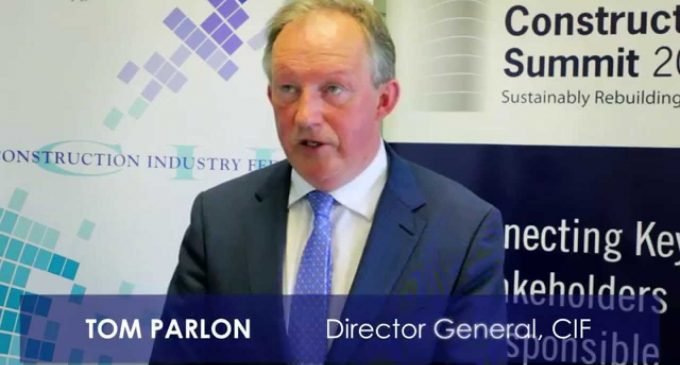Deferring investment in infrastructure until 2019 will consign Irish economy to lower growth over next decade – CIF

Statement from CIF Director General Tom Parlon.
“Whilst a commitment to increase infrastructure investment is welcome; waiting until 2019 to increase investment will consign many of Ireland’s regions to a decade of lost growth, exacerbate social inequalities and continue to see Dublin congest. If it’s a good idea to invest in 2019 to improve the economy and address the housing issue, lack of broadband and creaking road and rail infrastructure, why not start today? €1 billion invested in infrastructure in 2019 will yield less return for the economy than if it was invested today in 2017, due to depreciation and tender price increases in the interim. Waiting until 2019 to invest in a major road project such as the M20 will mean that we won’t see that road completed until nearly 2030.
A decade long neglect of infrastructure investment is negatively impacting on our economy and society now. Why wait to fix these problems? We must ask ourselves if we can sustain a current to capital expenditure ratio of 10:1 when our infrastructure is now identified as a key challenge to our competitiveness and economic growth.
In addition, insufficient attention is being paid to rigorous economic and social cost-benefit analyses of projects and how they interplay with each other. This exposes the lack of prioritisation of strategic infrastructure with delivery timeframes of 20 years open to the vagaries of the political system operating on a year to year basis.
We repeat our call for a National Infrastructure Commission to be established, similar in set up to the Irish Fiscal Advisory Council, whose role would be to advise government on strategic infrastructure to ensure the right combinations of projects are brought forward. This is a critical step in establishing a mature and efficient infrastructure delivery process and will determine the success of our economy and society over the horizon of the National Planning Framework up to 2040.
Our analysis of the existing Public Capital Programme shows that after other agreed commitments are factored in, only €1.515 billion remains for infrastructure investment over the next four years. To put that into perspective, the Metro North project would easily absorb all of this capital expenditure (and still not be completed), leaving nothing for other essential projects around the country.
More importantly, there are immediate actions which can be taken now, particularly with respect to transport projects, which would support our competitiveness. There are examples of projects, which could be delivered more speedily either directly with Exchequer funding or through PPP arrangements, if the forward planning of many essential projects was progressed rather than deferred.
The truth is that Ireland spends the least on infrastructure amongst all EU countries, as a percentage of GDP, at 1.7 per cent in 2015. The average rate was 2.7 per cent for the EU19 and 2.9 per cent for the EU28. When you consider that 40% of the programme has been committed to housing and an increasing amount of the remainder is spent on maintenance, there is very little left to develop the much needed infrastructure that will sustain our economy in the future.”







